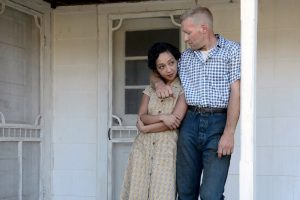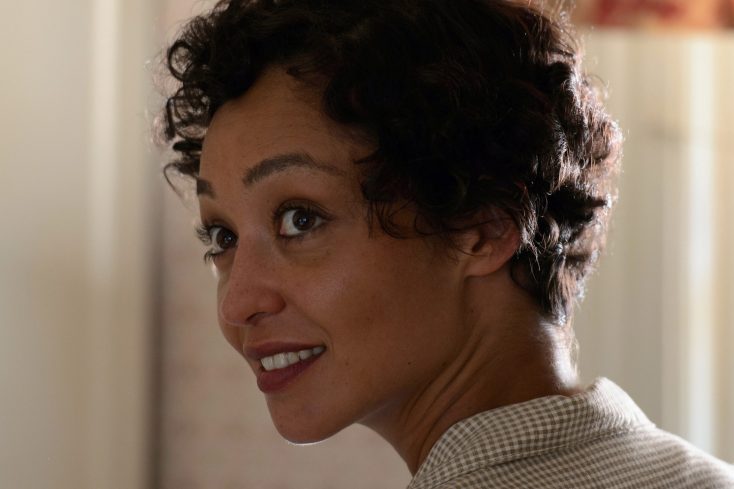
Ruth Negga (left) stars as Mildred and Joel Edgerton (right) stars as Richard in Jeff Nichols’ LOVING. ©Ben Rothstein / Focus Features
By ANGELA DAWSON
Front Row Features
HOLLYWOOD—In a year when long-simmering racial tensions have boiled to the surface, a drama about a biracial couple who fought the system that outlawed their union—and won—is coming to the forefront.
“Loving” stars Ruth Negga (TV’s “Agents of S.H.I.E.L.D”) and Joel Edgerton (“Star Wars: Episode 2—Attack of the Clones”) as real life couple Mildred and Richard Loving, whose interracial marriage was against in the law in the U.S. state of Virginia in the 1950s. When Mildred became pregnant, the couple was forced to live apart. But instead of complying the draconian law, they fought it, taking it all the way to the Supreme Court, which ruled in their favor in 1967.
The drama, written and directed by Jeff Nichols (“Take Shelter,” “Mud,” “Midnight Special”), celebrates the real-life courage and commitment exhibited by an ordinary yet courageous interracial couple.
Negga, who also is biracial—her mother is Irish and her father was Ethiopian— said it was a role she instinctively knew she wanted to play. She says the Lovings’ incredible story—they had to leave their Virginia home to live in Washington, D.C. for several years as the case went through the slow court process, has become an inspiration to interracial couples ever since. There is awards buzz surrounding Negga for her inspired performance in the film, as well as the film itself, which is timely in light of today’s divisive political climate.
Adopting a southern American accent for the role, Negga, who grew up in Ireland, said she felt she was in good hands with director Nichols as well as on-screen partner Edgerton, who plays her adoring husband. Fighting a cold, the actress, who has been dating British actor Dominic Cooper since 2010, soldiers through an interview dressed in an eye-catching dress adorned with playful cats.
Q: When you approach a role in this and the one in “S.H.I.E.L.D” is your working process the same? Or do you approach them differently?
Negga: I do. But I don’t anticipate that before I play a character. It’s hard to verbalize because it’s not a real cerebral experience for me. Sometimes it’s about sitting and meditating about the person, thinking about their energy and visualizing them doing things. As for Raina in “Marvel’s Agents of S.H.I.E.L.D.,” I very much based her on femme fatales. She kind of thinks she’s in this film noir. But there are also aspects of a street urchin about her and she’s very vulnerable. So it’s about weaving together different strings to bring this complex person so we’ll have to see what happens.
I don’t think these are divine interventions. It’s graft. If you do the hard work, between action and cut, something extraordinary can happen. Something unexpected. Something that surprises even you (the actor). That’s what I think is so brilliant and why I love acting and why I love seeing others act. If you’re willing to fly with that, then anything can happen.
Q: What did your research on the film entail?
Negga: I have to credit Nancy Buirski, who made a documentary called “The Loving Story” in 2011. It’s extraordinary and archival. She did all the homework for me. The footage of this couple was invaluable because it was all there. I knew as soon as I saw Mildred (Loving), I fell in love with her. I fell in love with her movements. I loved the way she had this openness about her, the physicality of her face and her being, because that’s who she was. Aside from “Shirley” (playing songstress Shirley Bassey), I’ve never enjoyed being in someone’s company so much as well as also being the company of Richard (played by Joel Edgerton). We all on this film genuinely loved this couple so much so that I know Joel and I were bereft when we finished filming. I went into mourning. What I took from it is that I’m a firm believer in traces of energy, residue of energy, and I can only hope that some of her rubbed off on me.
Q: Director Jeff Nichols said that the magic moment is when Richard sneaks back into the house and comforts you. What did Joel provide you as a scene partner in this film?
Negga: We egged each other on. It was a symbiosis that strangely mirrored the couple. We saw fairness in each other and I saw that I could go places with this person because I have his support and kindness and love. It was like Richard and Mildred—they liked each other, they really liked being in each other’s company. They respected one another, and that’s what we wanted to recreate. That’s what I had with Joel—we both wanted to do this couple justice but in order to do that, you have to be brave in your performance. You have to be brave enough to go there and brave enough to risk looking silly. Not that I was ever in fear of that because everybody on the set—everyone in the cast and crew—were reminding each other why we were doing it and we were holding each other up. It gave us the buoyancy and the strength and perseverance to honor this couple.
Joel is such a brilliant performer and one of the nicest human beings I’ve ever met. Like me, he enjoys a jovial set because then it makes everyone’s life easier. I don’t think you need seriousness in a clinical atmosphere to do your best work. You don’t need to show you’re doing really hard work to actually be any good and to actually translate (onscreen). I don’t go in for that. We liked being around one another, which was handy.
We do love one another because I think he’s a very special human being. And I love his Richard and I know he feels the same about Mildred. I know that my Mildred is as much his creation as it is mine, most definitely. But it’s also a credit to Jeff (Nichols, the director) because he has a knack for casting. He’s very intuitive about these things. Even the behind the scenes people—he works with the same cinematographer and the same art director again and again, because there’s a shorthand that develops. We all have the same sort of desire to do the best possible job that we can so all egos are left at the door.
Q: Aside from the 2011 HBO documentary “The Loving Story,” what sort of research did you do? Did you sit down with Peggy, their surviving daughter?
Negga: No. I didn’t want to use Peggy as research. I didn’t feel comfortable with that. It wasn’t necessary. I didn’t want to bombard her with questions. They’re quite a reserved family. Also, I didn’t want to do work that I didn’t need to do for the sake of doing research because ultimately it’s not about what you’re seen doing as it is what’s translated onto the screen. What I wanted more was Peggy’s approval, her blessing. I knew in my heart of hearts that we were going to get it because I knew we were going into it with love and admiration for this couple. We had a desire and a need to do them justice. So I wasn’t worried about that because I knew if we could show that to her, she would see it and be pleased. When Jeff and I went to meet her, I just sat there. They talked about the script and I just sat and absorbed her and her energy and I think she did the same of me because we’re both quite shy. What she said was moving to me. She said you have a good spirit. As you can see from the documentary, words can sometimes get in the way of communication. I don’t know if they’re always the truth tellers. I’m more interested in the energies and the actions.
When Peggy came to the set she gave us confidence and I think that was very generous of her. She’s an extraordinary woman.
Q: Was it difficult to play someone who is so reserved and yet has such a strong indomitable streak?
Negga: I’m glad people are picking up on that. I’ve been having a lot of conversations with women lately about the nature of strength and how we cast it in our arts. It’s sometimes a bit too straightforward, like “strong” is big and loud but that’s a bit basic. Certainly Mildred, who is shy and reserved also had a real sense of herself and what she believed is right. She also had a high self-esteem and self-confidence about her.
Today we kind of associate shyness and quietness with subservience, but I think that’s really lazy and it’s also not interesting. (She laughs.) Anything that diminishes us, as a human experience, is not interesting to me. Anything that ignores complexities in order to have a neat and tidy story is not interesting to me, and I don’t think it’s interesting to most people. Even if they’re unconscious of it, we’re intuitive that way.
Jeff (Nichols, the director) doesn’t patronize the audience. He doesn’t dictate feelings they should be having (such as) “this is the crying part” and “this is the furious part.” It’s not that he doesn’t elicit those feelings, he does, but it’s in a very organic, beautiful way. That’s why I think Mildred has captured people, their souls and imaginations.
I think they both have this beautiful energy. Richard is so sweet in his reluctance; it’s not foolishness, it’s not stubbornness. There’s a sweetness about him. He just wants to be left alone. In his own way, he’s tenacious as well because he says, “I’m not going to divorce her. Tell the court I love my wife.” These are extraordinary statements that people wouldn’t assume to come out of his mouth because they’re rural and ordinary and not as educated as others. Other people would assume they weren’t articulate. But on the contrary, they’re more articulate than most of the people I know. (She laughs.)
Mildred, for me, just glows. That was sort of the challenge in translating that but I had a lot of help.





